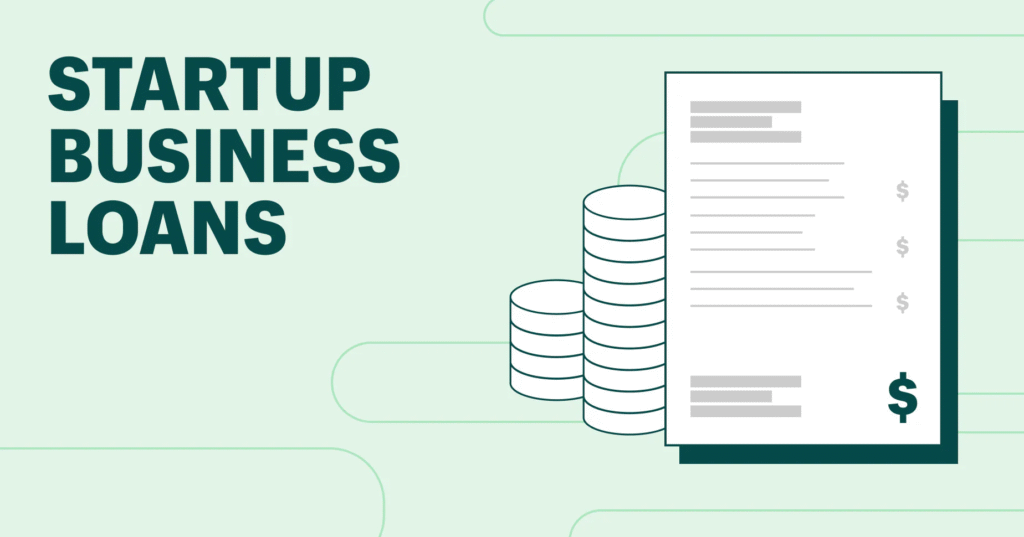Starting a business is an exciting yet challenging journey. One of the biggest hurdles new entrepreneurs face is securing adequate funding to launch and grow their startups. A business loan for a startup can provide the much-needed financial boost to turn ideas into reality. But what exactly is a startup business loan? How do you qualify? What are the best options available? This article dives deep into these questions to help you make an informed decision. 💡
Key Takeaways: 📌
- Startup business loans provide capital to fund new ventures, covering expenses like equipment, inventory, and marketing. 📊
- Different loan types include term loans, SBA loans, microloans, and online business loans. 💰
- Qualification depends on creditworthiness, business plan, and collateral. 📝
- Understanding interest rates, repayment terms, and eligibility criteria is crucial before applying. 🔍
- Proper use of business loans can accelerate growth and improve cash flow. 📈
What Is a Business Loan for Startup? 🤔🏢
A business loan for startups is a financial product designed to provide entrepreneurs with the funds necessary to start or expand their new business. Unlike personal loans, these are tailored specifically for business needs and often come with terms that suit company growth trajectories. 🎯
Startups typically need loans to cover:
- Initial inventory or raw materials 📦
- Equipment purchase 🛠️
- Office or storefront rent 🏬
- Marketing and advertising costs 📢
- Hiring staff or contractors 👥
Since startups usually lack an established revenue stream or business history, lenders see them as higher risk, which affects the loan terms. ⚠️
Why Do Startups Need Business Loans? 💡💵
Starting a business requires capital, and often the founder’s savings aren’t enough. Here’s why business loans are essential:
- Initial Investment: To cover setup costs that savings or angel investments don’t fully meet. 💸
- Cash Flow Management: To maintain smooth operations during early stages when sales are unpredictable. 🔄
- Growth Opportunities: To scale quickly when market opportunities arise. 📈
- Build Credit History: Accessing loans responsibly helps startups build credit profiles for future funding needs. 🏦
Types of Business Loans for Startups 💳
Understanding the different types of loans available helps you choose the right one. Here are common loan types for startups:
1. Term Loans 📅
Term loans provide a lump sum upfront, which you repay with interest over a fixed period. These can be short-term (up to 1 year) or long-term (1-10 years).
2. SBA Loans 🇺🇸
Small Business Administration (SBA) loans are government-backed loans that offer favorable terms but require stringent eligibility checks and paperwork.
3. Microloans 🐜
Microloans are smaller loans typically under $50,000, offered by nonprofit organizations or community lenders, ideal for very early-stage startups.
4. Online Business Loans 💻
Online lenders provide faster loan approval and disbursal but often at higher interest rates compared to banks.
5. Equipment Financing 🏗️
This type of loan specifically funds equipment purchases and is secured by the equipment itself.
6. Invoice Financing 📄
If your startup invoices other businesses, invoice financing lets you borrow against outstanding invoices to improve cash flow.
How to Qualify for a Startup Business Loan? ✔️
Qualifying for a loan as a startup can be tricky but not impossible. Lenders typically evaluate:
- Credit Score: Personal and business credit scores show your reliability. 📊
- Business Plan: A solid, detailed plan proves your business potential. 📃
- Collateral: Assets you can pledge reduce lender risk. 🏠
- Revenue Projections: Although startups lack history, projected revenues help. 📈
- Experience: Your background in the industry matters to lenders. 👔
- Down Payment: Some lenders require upfront equity from the borrower. 💰
Steps to Apply for a Startup Business Loan 🏦📝

Step 1: Assess Your Funding Needs 💡
Calculate how much capital you need and what it will be used for. Avoid borrowing more than necessary.
Step 2: Prepare a Detailed Business Plan 📝
Your plan should include market analysis, revenue projections, and financial statements.
Step 3: Check Your Credit Score 📊
Review and improve your credit score if possible before applying.
Step 4: Gather Required Documents 📂
This may include tax returns, financial statements, business licenses, and collateral documentation.
Step 5: Research and Compare Lenders 🔍
Look for the best rates, terms, and eligibility criteria.
Step 6: Submit Your Application 🖊️
Complete the application carefully and provide all required info.
Step 7: Negotiate Terms and Close the Loan 🤝
Once approved, review terms and negotiate if needed before signing.
Pros and Cons of Taking a Business Loan for Startup ⚖️
Pros ✅:
- Access to capital to fund growth 💸
- Builds business credit history 📈
- Fixed repayment schedules help with planning 📅
- Can be used for various business needs 🏢
Cons ❌:
- Debt obligation can strain cash flow 💥
- Risk of losing collateral if you default ⚠️
- Interest payments add to costs 💰
- Qualification can be difficult for startups 🔒
Alternative Funding Options for Startups 💡💸
If loans don’t seem right, consider:
- Angel Investors: Wealthy individuals investing capital for equity. 😇
- Venture Capital: Institutional investors funding startups with high growth potential. 💼
- Crowdfunding: Raising small amounts from many people online. 🌐
- Grants: Government or private funds that don’t require repayment. 🎁
How to Use a Business Loan Effectively? 🎯💼
Smart use of loan funds is essential:
- Stick to your budget and funding plan. 📊
- Prioritize investments that generate revenue quickly. ⚡
- Avoid using loans for personal expenses. 🚫
- Monitor your cash flow closely. 🔍
- Pay on time to build a good credit record. 🕒
What Are the Different Types of Startup Business Loans? 💳

When it comes to funding your startup, understanding the different types of business loans available is crucial. Startups have access to a variety of financing options tailored to their unique needs and risk profiles. Term loans offer lump-sum payments repaid over fixed terms, providing predictable budgeting. SBA loans, backed by the government, often come with lower interest rates but require more documentation and a strong credit history. Microloans serve small amounts ideal for very early-stage startups or niche projects. Online lenders provide quick access to funds but may charge higher interest rates. Additionally, equipment financing and invoice financing help startups secure capital tied to assets or receivables. Selecting the right loan type depends on your funding needs, repayment ability, and eligibility, ensuring your startup can leverage capital efficiently and sustainably.
How to Build Business Credit as a Startup? 🏦
Building business credit is foundational for startups seeking loans or favorable financing terms. Since most startups don’t have a financial track record, lenders often rely on personal credit initially, which can limit borrowing power. To build strong business credit, startups should start by registering their business entity and obtaining a Tax Identification Number (TIN). Opening a business bank account and applying for small vendor credit lines can help establish credit history. Paying bills and loans on time boosts credit scores. Monitoring your credit reports regularly allows you to catch errors early and maintain good standing. Over time, building a solid business credit profile improves your chances of securing larger loans with better interest rates, helping your startup grow sustainably without relying solely on personal guarantees.
What Documents Are Needed to Apply for a Startup Business Loan?
Applying for a startup business loan requires preparation and documentation to convince lenders of your creditworthiness and business viability. Essential documents typically include your Business plan detailing how funds will be used and projected revenues. Financial statements such as bank statements, cash flow projections, and personal and business tax returns demonstrate your financial health. Legal documents like business licenses, registrations, and incorporation papers verify legitimacy. Lenders may also ask for personal identification and credit reports to assess risk. Depending on the loan type, collateral documentation might be needed. Having these documents well organized and accurate improves your chances of fast loan approval, reduces delays, and builds trust with lenders.
Also Read : What Are the Best Online Business Ideas?
Conclusion 🎯
Obtaining a business loan for your startup can be a crucial step towards realizing your entrepreneurial dreams. While it comes with challenges like qualifying and managing debt, the right loan can provide the fuel needed to kickstart your business operations and scale efficiently. Remember, a well-prepared business plan, clear funding purpose, and understanding of loan terms will greatly increase your chances of approval and success. Always weigh loan options carefully and consider alternatives if they better suit your needs.
FAQs ❓💬
1. Can a startup with no revenue get a business loan?
It’s challenging but possible with a strong business plan, collateral, or a co-signer. Microloans or SBA loans might be more accessible.
2. What is the typical interest rate on a startup business loan?
Interest rates vary widely, from 6% for SBA loans to over 30% for online lenders, depending on creditworthiness and loan type.
3. How much can I borrow for my startup?
Loan amounts range from a few thousand dollars (microloans) up to several hundred thousand or more (term or SBA loans).
4. Do I need collateral for a startup business loan?
Some loans require collateral, but unsecured loans are available at higher rates.
5. How long does it take to get a business loan approved?
Traditional bank loans may take weeks or months; online loans can be approved in days.
6. What happens if I can’t repay my business loan?
Failure to repay can result in damaged credit, collection actions, and loss of collateral.
7. Are there special loans for women or minority entrepreneurs?
Yes, many lenders and government programs offer loans targeted to women, minorities, and veterans.
